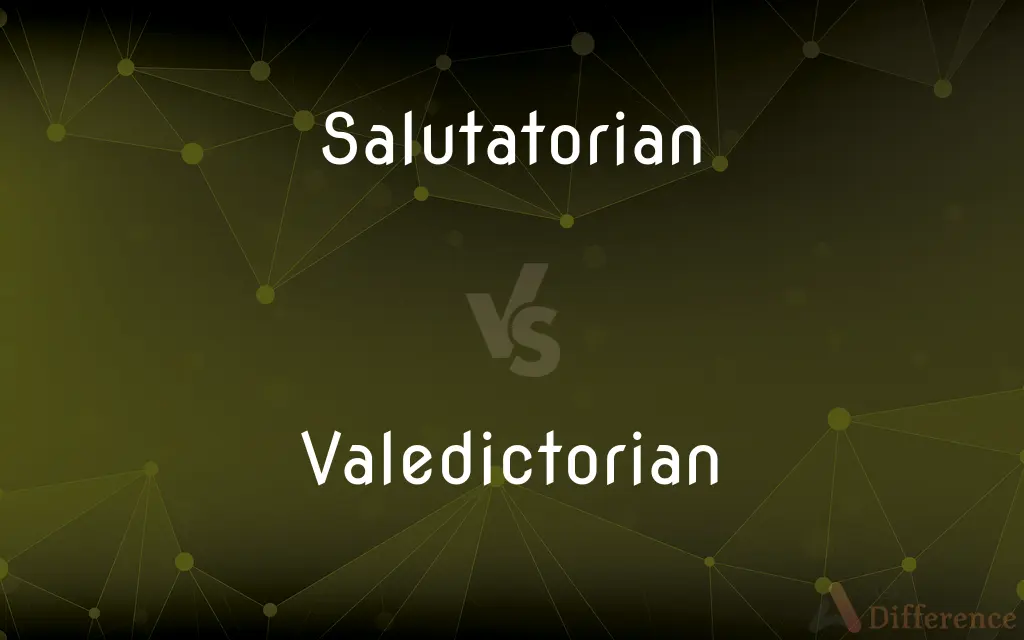Salutatorian vs. Valedictorian — What's the Difference?
By Urooj Arif & Fiza Rafique — Updated on May 21, 2024
A salutatorian is the student with the second-highest academic rank in a graduating class, while a valedictorian holds the highest rank and delivers the valedictory speech.

Difference Between Salutatorian and Valedictorian
Table of Contents
ADVERTISEMENT
Key Differences
A salutatorian is typically the student with the second-highest GPA in their graduating class. A valedictorian, on the other hand, is the student with the highest GPA in the graduating class.
This (salutatorian ) student often delivers the opening or welcoming address at the commencement ceremony. The role acknowledges their academic excellence and leadership within the student body. This (valedictorian) prestigious position involves delivering the valedictory speech, which is intended to bid farewell to classmates and reflect on their shared experiences. The valedictorian’s speech often includes inspirational messages and hopes for the future.
The selection criteria for both positions usually focus on academic performance, measured by GPA. However, some schools may also consider extracurricular involvement and leadership qualities. Both roles celebrate outstanding academic achievements but with different ceremonial duties.
In terms of recognition, a salutatorian is honored as the runner-up to the valedictorian. This distinction emphasizes the high level of competition and excellence within the graduating class.
The valedictorian, being the top student, often receives additional accolades and sometimes scholarships. Their speech is a highlight of the commencement ceremony, symbolizing their role as a representative of the academic success of the class.
ADVERTISEMENT
Comparison Chart
Academic Rank
Second highest in the class
Highest in the class
Speech Role
Delivers the opening or welcoming address
Delivers the valedictory speech
Selection Criteria
Based on GPA, possibly extracurricular activities
Based primarily on GPA, sometimes other factors
Recognition
Runner-up to valedictorian
Top academic honors, often additional accolades
Symbolism
Represents academic excellence and leadership
Represents the pinnacle of academic achievement
Compare with Definitions
Salutatorian
A student who gives the salutatory address at a graduation ceremony.
As salutatorian, he welcomed everyone to the commencement ceremony.
Valedictorian
The student who delivers the farewell speech at a graduation ceremony.
The valedictorian's address focused on the future goals of the graduates.
Salutatorian
Recognized for nearly top academic achievements.
Being salutatorian, Maria received several scholarships.
Valedictorian
The top-ranking student academically.
John achieved the title of valedictorian after four years of hard work.
Salutatorian
Often involved in student leadership roles.
The salutatorian also served as the vice-president of the student council.
Valedictorian
The student with the highest GPA in a graduating class.
She was honored as the valedictorian for her impeccable academic record.
Salutatorian
The student with the second-highest GPA in a graduating class.
Jessica was named the salutatorian of her class for her outstanding academic record.
Valedictorian
Represents the pinnacle of student academic achievement.
The valedictorian inspired his peers with his dedication and achievements.
Salutatorian
The second-ranking student in terms of academic performance.
The salutatorian's speech was both inspiring and heartfelt.
Valedictorian
Often awarded additional honors and scholarships.
As valedictorian, he received a full scholarship to his chosen university.
Salutatorian
Salutatorian is an academic title given in the United States, Armenia, and the Philippines to the second-highest-ranked graduate of the entire graduating class of a specific discipline. Only the valedictorian is ranked higher.
Valedictorian
The student with the highest academic rank in a class who delivers the valedictory at graduation.
Salutatorian
The person who graduates high school with the second-highest GPA and thus gets to give the salutatory address during the graduation ceremony.
Valedictorian
The individual in a graduating class who delivers the farewell or valedictory address, often the person who graduates with the highest grades.
Salutatorian
The graduating student with the second highest academic rank; delivers the opening address at graduation exercises
Valedictorian
The individual in a graduating class who graduates with the highest grades.
Valedictorian
The student with the best grades who delivers the valedictory at graduation
Common Curiosities
Do valedictorians and salutatorians receive any special recognition?
Yes, they often receive special recognition, such as medals, plaques, or scholarships, and mention in the graduation program.
How is the valedictorian chosen?
The valedictorian is chosen based on having the highest academic performance, typically measured by GPA, according to the school's specific criteria.
What does the valedictorian speech usually include?
The valedictorian speech typically includes reflections on the class's experiences, gratitude, and thoughts about the future.
Is being a salutatorian considered an honor?
Yes, being named salutatorian is a significant honor that recognizes outstanding academic achievement.
What happens if there's a tie for valedictorian?
Schools may choose to have co-valedictorians or use additional criteria to break the tie, such as the number of advanced courses taken.
Do all schools have a valedictorian and salutatorian?
Not all schools follow this tradition; some may choose different methods to recognize graduating students' achievements.
Can there be more than one valedictorian or salutatorian?
Yes, some schools may have co-valedictorians or co-salutatorians in the case of identical academic records.
Can transfer students become valedictorian or salutatorian?
Policies vary by school, but transfer students may be eligible if they meet the academic and residency requirements set by the institution.
How important are extracurricular activities in determining valedictorian or salutatorian status?
While the primary criterion is usually GPA, some schools may consider extracurricular activities, leadership, and character.
How do valedictorians and salutatorians prepare for their speeches?
They may work with teachers, mentors, or speech coaches to craft messages that are inspiring, reflective, and appropriate for the occasion.
Is the selection process for valedictorian and salutatorian always transparent?
Schools strive for transparency, but the process can vary, sometimes leading to questions about criteria and selection.
What impact does being valedictorian or salutatorian have on college admissions?
While it's a prestigious achievement, colleges consider a range of factors, including test scores, essays, and extracurriculars, in admissions decisions.
What speech does the salutatorian give?
The salutatorian usually delivers the opening or welcoming address at the graduation ceremony.
What is a valedictorian?
A valedictorian is the student with the highest GPA in their graduating class.
What are the responsibilities of a salutatorian?
A salutatorian typically welcomes guests at the commencement and might be involved in other graduation-related activities.
Do valedictorians receive scholarships?
Valedictorians frequently receive scholarships and additional academic awards.
Can valedictorians or salutatorians lose their titles?
If academic performance drops significantly or due to disciplinary issues, it's possible but rare for these titles to be reassigned.
What speech does the valedictorian give?
The valedictorian gives the valedictory speech, which is a farewell address to the class.
Can there be more than one valedictorian?
Yes, in some schools, there can be co-valedictorians if multiple students achieve the highest GPA.
What are the responsibilities of a valedictorian?
A valedictorian delivers the valedictory address and often represents the class in various capacities.
What qualities are common in salutatorians and valedictorians?
Both are typically hardworking, high-achieving, and often involved in extracurricular activities.
What advice do valedictorians and salutatorians typically give in their speeches?
They often encourage their peers to pursue their dreams, embrace challenges, and remember the lessons learned during their education.
Is being a salutatorian a big honor?
Yes, being named salutatorian is a significant academic honor.
Do valedictorians and salutatorians have duties beyond graduation speeches?
Responsibilities vary, but they may also represent their class in other events or activities leading up to graduation.
What is a salutatorian?
A salutatorian is the student with the second-highest GPA in their graduating class.
How is a salutatorian chosen?
A salutatorian is chosen based on their GPA and sometimes their involvement in extracurricular activities.
How is a valedictorian chosen?
A valedictorian is chosen based on having the highest GPA in the graduating class, with some schools also considering other factors.
Can there be more than one salutatorian?
Some schools might have co-salutatorians if multiple students have similar GPAs.
Do salutatorians receive scholarships?
Yes, salutatorians often receive scholarships and other academic honors.
Is being a valedictorian a big honor?
Yes, being named valedictorian is the highest academic honor in a graduating class.
Share Your Discovery

Previous Comparison
Proficient vs. Competence
Next Comparison
Pharynx vs. LarynxAuthor Spotlight
Written by
Urooj ArifUrooj is a skilled content writer at Ask Difference, known for her exceptional ability to simplify complex topics into engaging and informative content. With a passion for research and a flair for clear, concise writing, she consistently delivers articles that resonate with our diverse audience.
Co-written by
Fiza RafiqueFiza Rafique is a skilled content writer at AskDifference.com, where she meticulously refines and enhances written pieces. Drawing from her vast editorial expertise, Fiza ensures clarity, accuracy, and precision in every article. Passionate about language, she continually seeks to elevate the quality of content for readers worldwide.
















































